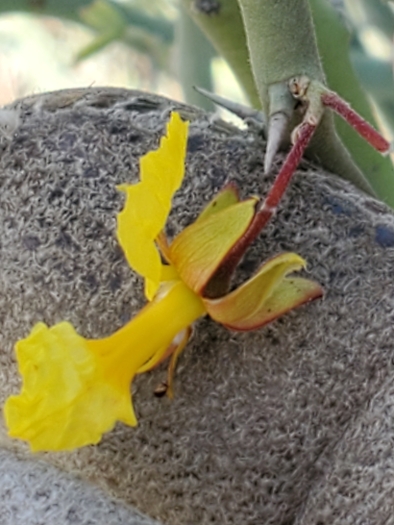Texas Palo Verde
(Parkinsonia texana)
Texas Palo Verde (Parkinsonia texana)
/
/

Jo Roberts
CC BY 4.0
Image By:
Jo Roberts
Recorded By:
Copyright:
CC BY 4.0
Copyright Notice:
Photo by: Jo Roberts | License Type: CC BY 4.0 | License URL: http://creativecommons.org/licenses/by/4.0/ | Rights Holder: Jo Roberts | Publisher: iNaturalist | Date Created: 2021-10-16T10:31:36-07:00 |




































Estimated Native Range
Summary
Parkinsonia texana, commonly known as Texas Palo Verde, is a deciduous small tree or large shrub native to the limestone hills, arroyos, and desert grasslands of Northeast Mexico and Texas. It belongs to the pea family, Fabaceae, and is well-adapted to arid environments. Texas Palo Verde typically grows up to 7.6 meters (25 feet) in height and can have a canopy spread of up to 6 meters (20 feet). Its form is often multi-trunked with an open, airy canopy. The bark is a distinctive green color, which allows for photosynthesis even when leaves are absent. The bright yellow flowers, occasionally tinged with red, are showy and bloom profusely from April to June, attracting pollinators such as bees. After flowering, it produces seed pods that are also characteristic of the pea family.
Texas Palo Verde is valued for its drought tolerance and ability to thrive in hot climates, making it a popular choice for xeriscaping and low-water-use gardens. Its green bark and yellow flowers add unique visual interest to the landscape. In cultivation, it requires minimal care, thriving in full sun and tolerating a range of soil types, though it prefers alkaline conditions. It is suitable for urban planting, as a specimen tree, or in naturalized areas where its open form can be appreciated. Despite its many benefits, gardeners should be aware that Texas Palo Verde can have thorns and may drop seed pods, which could require cleanup. Additionally, it is susceptible to Texas root rot in poorly drained soils.CC BY-SA 4.0
Texas Palo Verde is valued for its drought tolerance and ability to thrive in hot climates, making it a popular choice for xeriscaping and low-water-use gardens. Its green bark and yellow flowers add unique visual interest to the landscape. In cultivation, it requires minimal care, thriving in full sun and tolerating a range of soil types, though it prefers alkaline conditions. It is suitable for urban planting, as a specimen tree, or in naturalized areas where its open form can be appreciated. Despite its many benefits, gardeners should be aware that Texas Palo Verde can have thorns and may drop seed pods, which could require cleanup. Additionally, it is susceptible to Texas root rot in poorly drained soils.CC BY-SA 4.0
Plant Description
- Plant Type: Tree, Shrub
- Height: 6-25 feet
- Width: 6-12 feet
- Growth Rate: Moderate
- Flower Color: Yellow
- Flowering Season: Spring, Summer
- Leaf Retention: Deciduous
Growth Requirements
- Sun: Full Sun
- Water: Low
- Drainage: Medium, Fast
Common Uses
Bee Garden, Bird Garden, Butterfly Garden, Hummingbird Garden, Low Maintenance, Showy Flowers, Street Planting
Natural Habitat
Native to the limestone hills, arroyos, and desert grasslands of Northeast Mexico and Texas
Other Names
Common Names: Texas Paloverde, Border Palo Verde, And Retama China, Parkinsonia Florida
Scientific Names: , Parkinsonia texana, Parkinsonia texana var. macra, Cercidium texanum, Cercidium macrum, Parkinsonia macra, Parkinsonia texana var. texana,
GBIF Accepted Name: Parkinsonia texana (A.Gray) S.Watson